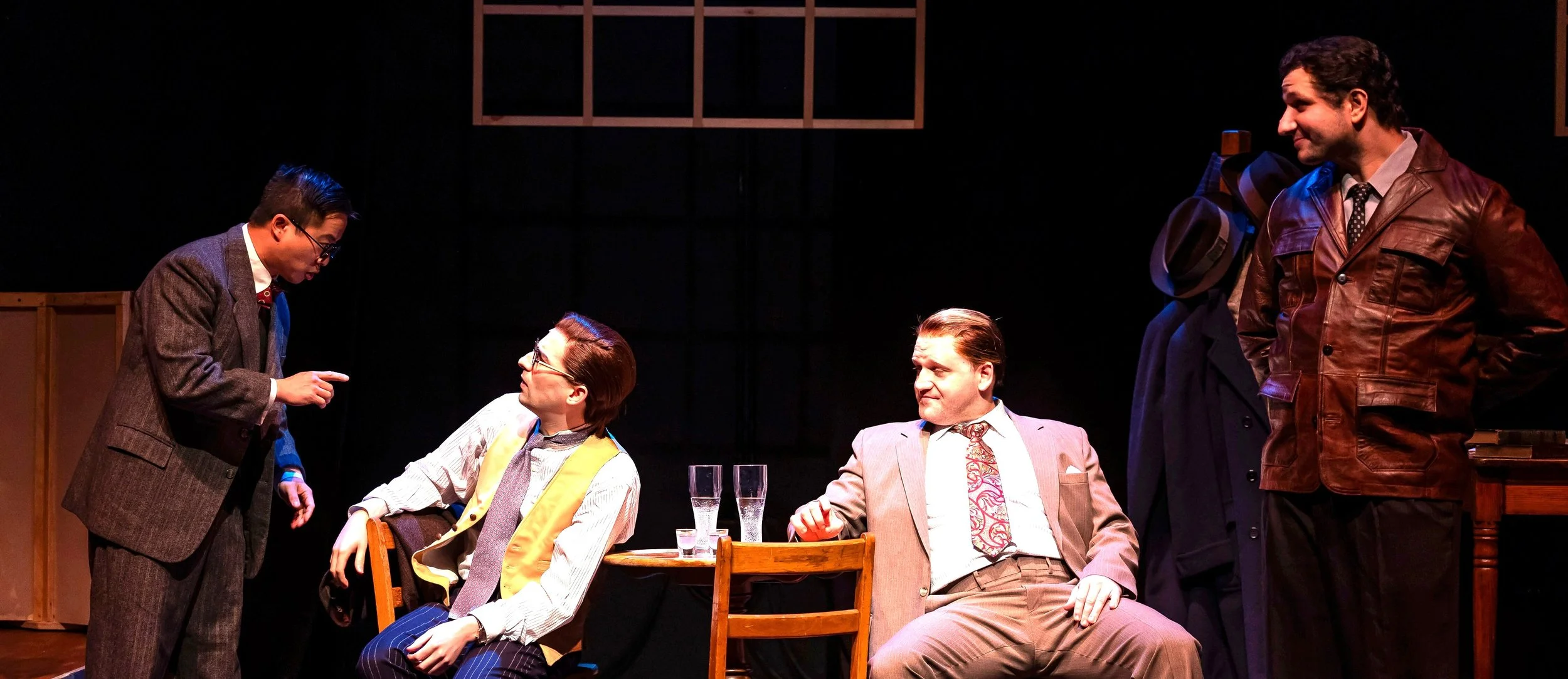The Golden Bride ("Di Goldene Kale"), a joyful operetta from 1923 performed on the compact stage at the Museum of Jewish Heritage by the National Yiddish Theatre Folksbiene, is set in a small Russian village and begins with a tongue-in-cheek song about money. In Yiddish with English and Russian supertitles, the cast sings “Oi, Oi, The Dollar” when Goldele, a young woman who has been raised by another family learns that her father, who moved to America when she was a child, has died and left her a fortune. Thus begins a tale that folds real-world politics (the metamorphosing face of Russia, immigration and the pursuit of money in America) into a fairytale of love and marriage.
Finding True Joy
Sex, drugs, alcohol and money does not bring contentment to New York City lawyers, but it is still entertaining to watch the lawyers search for inner peace. Ethan McSweeny directs an accomplished ensemble in Thomas Bradshaw’s Fulfillment. Set in present-day Manhattan, the play covers ridiculous housing challenges and various pathways to self-satisfaction that resonate with New Yorkers.
The play's protagonist is a 40-year-old black lawyer named Michael (Gbenga Akinnagbe), who has worked 80 hours a week for the past nine years at a law firm with the same title of senior associate. Although Michael's colleague Steven started at the law firm the same time as Michael, Steven has been promoted to partner and makes $800,000 a year. Michael’s white, office hookup-turned girlfriend Sarah (Susannah Flood) claims that Michael has not been promoted to partner because of racism. She says, “Just think about it. No women partners, no black partners. I’m telling you this because we’re two of the only people from under-represented groups working here. We need to stick together.”
Whenever Michael’s white boss Mark (Peter McCabe) has a new, black client, Mark “trot[s] [Michael] out like a show horse!” Mark claims that Michael has not been made partner because Michael has a drinking problem. Mark offers to have the firm pay for Michael to go to rehab, but Michael does not want to be away from work for that long. Michael also just bought a “shoebox in Soho” to live in for $1.5 million and had to borrow $80,000 from his mother’s retirement to help cover the down payment. Sarah says that Michael should instead “be living in a five million dollar apartment.”
This play’s message about happiness not being found in external things is communicated well. The value of this production is demonstrated in how this message is shown through the breakdown of Michael’s life. Audiences witness how Michael’s alcohol dependency feeds his insecurities and ultimately sabotages everything Michael has been trying to create for himself. New York City theatergoers will also easily relate with the intolerable amount of noise from Michael’s upstairs neighbor Ted (Jeff Biehl). The situation only escalates when Michael complains to the president of his condo association Bob (Denny Dillon).
As a grown man, Michael appears naive and boyish and easily manipulated by others. His own identity and sense of self-worth are questionable. Akinnagbe conveys Michael’s innocence eloquently and this allows for audiences to eventually develop compassion for Michael’s struggle. It also softens the cold, robotic, conniving exterior behavior of the other characters. Audiences begin to understand the roots of Michael’s alcoholism when Sarah says, “It’s only natural that you have no idea how to deal with people. You stopped maturing emotionally the second you started to drink [alcohol].” Michael started drinking when he was 16 years old.
As the characters seek fulfillment in their own lives, theatergoers may start to wonder if this production achieves what it set out to accomplish. Even with stellar performances like McCabe perfectly nailing his portrayal of Michael’s boss, the production seems like it is still in its adolescent stages. The material is fresh, quick and current but feels underdeveloped. The scenes tend to be short and end too prematurely for audience members to get the full emotional impact. The creative transitions between the scenes are flawless due to the lighting by Brian Sidney Bembridge and sound by Mikhail Fiksel and Miles Polaski. However, the multiple transitions become disruptive and lose their originality after a while. At times, the production relies on engaging audiences by using intense sexual scenes with masturbation, S&M and full-frontal nudity. Sex choreographer Yehuda Duenyas creates very realistic sexual scenes and it is like sitting on the set of a pornographic film.
Fulfillment does capture modern life in New York City and creates a greater conversation around what motivates and drives people. At the same time, Bradshaw could have focused more on universal, redeeming qualities. This would add depth to the production’s message and allow for audiences to empathize with the characters’ vulnerabilities. McSweeny could also achieve this through directing the actors to have more emotional range in their performances.
The overall aim of this production falls short, and the production’s message has so much potential to mature and could even be further developed. Despite these weaknesses, the cast is superb and well worth seeing in this production. The Flea Theater has produced award-winning Off-Off-Broadway productions and is known for showcasing current and original material. For those seeking a captivating glimpse into the life of an alcoholic lawyer in New York City who has not come to terms with his alcoholism, then see Fulfillment.
Thomas Bradshaw's Fulfillment runs until Oct. 19 at The Flea Theater (41 White St. between Church St. and Broadway) in Manhattan. Evening performances are Wednesday–Monday at 7 p.m. and matinee performances are Sunday at 3 p.m. Tickets are $35, $55, $75 and $105 and can be purchased by calling 212-352-3101 or visiting www.theflea.org.








